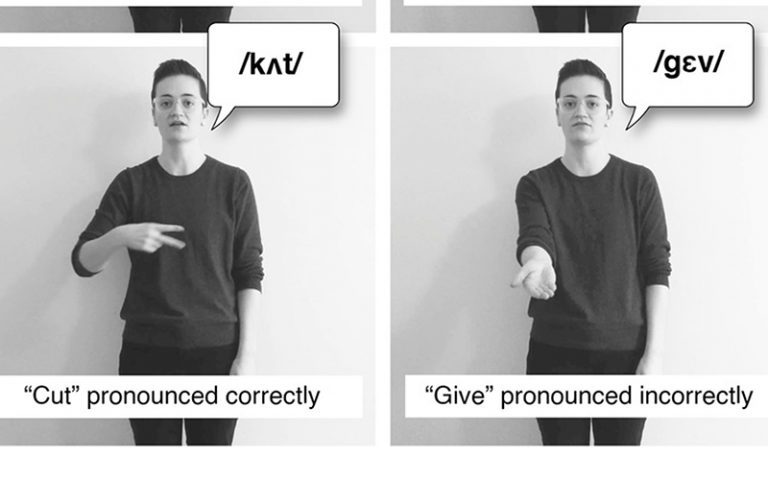IOE alumna’s MA dissertation published in Modern Language Journal
29 September 2022
Former student Page Wheeler has published a paper in one of the best known and highly regarded modern-language journals in the world, based on her MA dissertation at IOE, UCL’s Faculty of Education and Society.

The paper interfaces existing literature in second language pronunciation and psycholinguistics. In it, Page examines how second language speech intelligibility can be affected not only by phonological errors, but also by visual and gestural information.
The paper originated from Page’s (Teaching English to Speakers of Other Languages (TESOL) MA dissertation on how second language users use both visual and phonological cues to decode foreign language speech, entitled ‘The effect of vowel accuracy, visual speech, and iconic gesture on intelligibility’.
Her work is one of the first empirical studies that has shown that not only language but also gesture matters for successful second language communication, which gives rise to many pedagogical implications.
After completing her TESOL MA in 2019, Page’s dissertation was selected as the best in her cohort, and was subsequently chosen as the winner of the annual British Council ELT Master’s Dissertation Award with Best Potential for Impact on English language teaching (ELT). She is the first IOE student to receive this honour.
Page has also written an accessible summary of her findings for teachers and students.
Her supervisor, Associate Professor Kazuya Saito, commented: “Since I started teaching at IOE, I have always been impressed by the quality of our students. Page is a star example of our cohort, and the first winner of the best MA dissertation award at IOE. Never have I seen an MA student publishing their dissertation at the number one journal in our field, the Modern Language Journal. I feel this achievement shows that with passion, diligence, and great training, anything can be possible within only one year of MA study at IOE.”
We asked Page...
In your opinion, why should someone study language acquisition?
"There are many reasons to study second language acquisition, but one of the primary motivations for me has always been academic curiosity. One thing that struck me during my Master’s experience was how much we still don’t know about how people learn languages, which for me is the exciting part."
Do you have any advice for students currently writing their dissertations?
"If you’re working long hours while writing your dissertation right now, remember that it is important to take breaks, not just for your own well-being but also for the sake of your overall productivity. Your mind needs breaks to work effectively!"
What else have you been doing since graduating?
"I’m currently working as an academic copy editor, helping authors perfect their articles, often in the hopes of getting their work published. I read a lot of TESOL and linguistics papers, but I also get the chance to work with authors from other fields, so I’m always learning something new!"
The Modern Language Journal publishes high-impact research and discussion about the learning and teaching of foreign and second languages.
Links
- Read the paper: ‘Second language speech intelligibility revisited: differential roles of phonological accuracy, visual speech, and iconic gesture’
- Teaching English to Speakers of Other Languages (TESOL) MA
- Centre for Applied Linguistics
- Department of Culture, Communication and Media
Image
Wheeler, P. and Saito, K. (2022), Second Language Speech Intelligibility Revisited: Differential Roles of Phonological Accuracy, Visual Speech, and Iconic Gesture. The Modern Language Journal, 106: 429-448. Extract cropped from Figure 1: Overview of the Designs and Conditions Used in the Experiment.
 Close
Close

